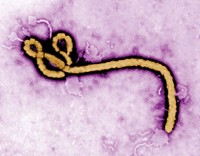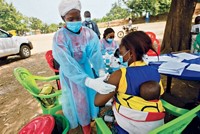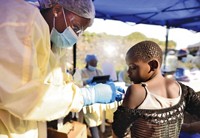Advertisement
Grab your lab coat. Let's get started
Welcome!
Welcome!
Create an account below to get 6 C&EN articles per month, receive newsletters and more - all free.
It seems this is your first time logging in online. Please enter the following information to continue.
As an ACS member you automatically get access to this site. All we need is few more details to create your reading experience.
Not you? Sign in with a different account.
Not you? Sign in with a different account.
ERROR 1
ERROR 1
ERROR 2
ERROR 2
ERROR 2
ERROR 2
ERROR 2
Password and Confirm password must match.
If you have an ACS member number, please enter it here so we can link this account to your membership. (optional)
ERROR 2
ACS values your privacy. By submitting your information, you are gaining access to C&EN and subscribing to our weekly newsletter. We use the information you provide to make your reading experience better, and we will never sell your data to third party members.
Vaccines
A big week for Ebola vaccines
Merck’s Ebola vaccine gets approved while public health workers deploy Janssen’s
by Megha Satyanarayana
November 14, 2019
| A version of this story appeared in
Volume 97, Issue 45

As the Ebola outbreak in the Democratic Republic of the Congo continues, European regulators have approved the first vaccine against the deadly virus, and public health workers began what could be the final round of testing for a second vaccine. These vaccines, coupled with two experimental treatments used in the Congo, could change Ebola from a disease that is nearly always fatal to one that can be cured and prevented.
The first vaccine, a single-dose live concoction called Ervebo, has been in testing since 2014. It was developed in Canada and eventually licensed by Merck & Co. and first used during the massive outbreak in West Africa that ended in 2016. It has been used to vaccinate some 250,000 people during the current outbreak.
After the Merck vaccine earned marketing authorization from the European Commission, the World Health Organization (WHO) gave its stamp of approval, which agencies like Unicef and the United Nations use when deciding to deploy vaccines in high-risk areas.
On Twitter, WHO director general Tedros Adhanom Ghebreyesus praised the outcome.
“This is a historic step towards ensuring the people who most need an #Ebola vaccine are able to access this life-saving tool. With a prequalified vaccine and experimental therapeutics, Ebola is now preventable and treatable,” the WHO director says.
The most recent Ebola outbreak, which began in August 2018, is centered on three provinces in the eastern part of Congo. The Merck vaccine has been used in a ring vaccination strategy: people who have come in direct contact with an infected person are inoculated, and a secondary group of people who have come in contact with the inoculated person are themselves inoculated.
In addition to the vaccines, several antibody-based treatments have been tested during this outbreak. Two have emerged as having the greatest potential to cure the viral illness. One treatment is made by Regeneron, and the other is made by the National Institute of Allergy and Infectious Diseases and licensed by Ridgeback Biotherapeutics. The treatments have reduced mortality from around 90% to up to 11%.
Efforts to test a second vaccine in the Congo started on Nov. 14 in areas close to the center of the outbreak that have not yet seen high numbers of infections. The vaccine is a two-dose protocol, spaced 8 weeks apart, says Macaya Douoguih, who heads clinical development at Janssen, the maker of the vaccine. Earlier in November, the company submitted its applications for approval to the European Medicines Agency, after several prior rounds of testing outside the Congo. Douoguih says Janssen is in discussions with the US Food and Drug Administration about the vaccine pair.
Douoguih says the Janssen and Merck vaccines should be viewed as complementary: a single-dose vaccine is suited for an outbreak setting, whereas a dual-dose vaccine is suited for a preventive setting. The company will provide 500,000 regimens of the two-dose vaccine, with an initial goal of inoculating 50,000 people. The trial is starting in the city of Goma, south of the affected area. Officials will be looking at safety. Should the outbreak, which appears to be slowing, ramp up again and move to where the Janssen vaccine has been deployed, Douoguih says Janssen and their partners on the ground in the Congo will have some opportunity to test for efficacy as well.
“I think there needs to be multiple vaccines,” she says. “There may be different uses for those vaccines. Ebola is not going away.”





Join the conversation
Contact the reporter
Submit a Letter to the Editor for publication
Engage with us on Twitter